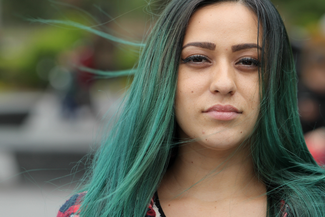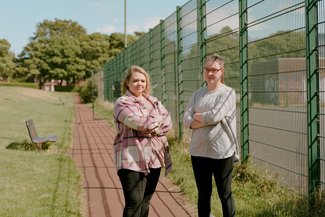
Young Women's Justice Project
Engaging with young women, front-line staff and other experts to build an evidence base about the needs of girls and young women in contact with the criminal justice system.

17 Jan 2024
Our recently published briefing, A Call to Action, focuses on the needs of young women (17-25) in contact with the criminal justice system. It forms part of our Young Women’s Justice Project, making the national case for age-, gender-, culturally, and trauma-responsive specialist services for women of this age group.
In this two-part blog, we explore an example of good practice: Newham's pilot young women’s Youth to Adult probation hub, delivered by Advance, a domestic violence charity with a specialist focus on supporting women in contact with the criminal justice system.
In Part I, Zoe, one of Advance’s keyworkers, and Loishana, a young woman she supported, discussed the importance of a gender-responsive approach to probation, the need for consistent, specialist support to build trust and navigate services, and the ways young women’s needs are overlooked. Here, they continue their conversation.
Loishana felt failures to listen to her and respond to her needs had been ongoing since her childhood: “My experiences [at school] weren’t positive, there was a lot of bullying, I didn’t have open spaces or anyone I could go to speak to. I tried to speak to teachers and all they did was call my parents in, but then the physical and mental abuse was still continuing.”
Loishana acknowledged the reason she came to the hub was to do with an offence to do with weapons, connected to her ex-partner. We talked about how a lack of a safe, supportive family network leaves young women open to exploitation. Zoe affirmed our recommendations for investing in prevention more robustly:
Z – “Sometimes it is like, we’re lucky, we catch them right at the beginning so we can deter them, but there needs to be more preventative work. A lot of my cases are to do with young women’s “boyfriends” who ask them to hold something for them, or put something in their house, and now they’re getting arrested and they’ve got a criminal record.”
The briefing evidences that young women can benefit from peer support that is managed by experts, developing positive and trusting relationships with both peers and professionals.

It was clear that connected to this are the positive relationships young women can build with each other, which support their ability to stay healthy and safe. Both felt there was still a need beyond 18 to access gender-responsive information and care that may have been missing from family settings or at school:
Z – “There’s things you can’t talk about [in a mixed gender space]. We openly spoke about STDs, all of that – if a man was there, we couldn’t have those conversations about topics that maybe their mothers haven’t spoken about or had brushed over in school. When they come together, they really speak and communicate and they realise, “Wow, it’s not just me and I’m not the only person going through this and I don’t feel alone.”
One of A Call to Action's five key recommendations is for specialist services to embed lived experience and expertise into the design of their programmes.

L – “When you are in that kind of space, when you’re in the criminal justice system, it’s designed to make you feel like a criminal and it was just nice to come to space where there were other young women… I think that the bracket from 18-25 is very vital, especially in a young person’s life. When you turn 18, everybody just forgets about you, you’re meant to fend for yourself, but with the hub they really left that big age group and left it open for us to come.”
Loishana felt the young women’s opinions were actively sought in terms of the support they received: “I feel like the workshops weren’t forced on us. If Zoe had an idea, such as inviting someone to speak about sexual health, she would ask us how we feel about that. We were always kept in the loop and always asked our opinions, and allowed to talk through our own ideas. I think that’s really good, that we were really included and our voices were heard.”
Loishana also highlighted the importance of being supported by and learning from others with lived experience. Talking about an entrepreneurship workshop she had organized, Zoe said: “The woman that did it for us, she got kicked out at 14, and then from there she had to build herself up, and now she has her own business. I think for the young women it was important to hear from someone who they can relate to.”
L - “We need more women speaking to young people who have been through these experiences, because it really motivates you. It turns into what I said about feeling like you’re a criminal, and that you can’t achieve anything, if you’ve been arrested or had trauma in your life – it doesn’t mean you can’t achieve anything.”
We ended by talking about what they would want to say to people in power. Both Zoe and Loishana, like us, advocated for the need for more funding, and the expansion of services like the Y2A hub:
L – “We need to make more [hubs], there’s no question about it. It’s really changed my outlook on life, it’s built my support system. The advice – it’s really needed for a young woman. [These hubs] are useful and they change lives.”
Z - “If government give us money, really, we can do the work – we can prevent young women from getting involved in the criminal justice system. If we had the right funding, we could support people like Loishana who have lived experience and do key work sessions. I always say she would be a fantastic key worker, with her experiences, her drive, her passion: she could really help young women, her story could help someone else’s life.”

Engaging with young women, front-line staff and other experts to build an evidence base about the needs of girls and young women in contact with the criminal justice system.

A new briefing paper published today by Agenda Alliance and Alliance for Youth Justice (AYJ) reveals the severe mental health problems facing young women in our prisons.

As part of our Young Women's Justice Project, we recently spoke to two young women with lived experience of the criminal justice system, asking them what they think needs to change.